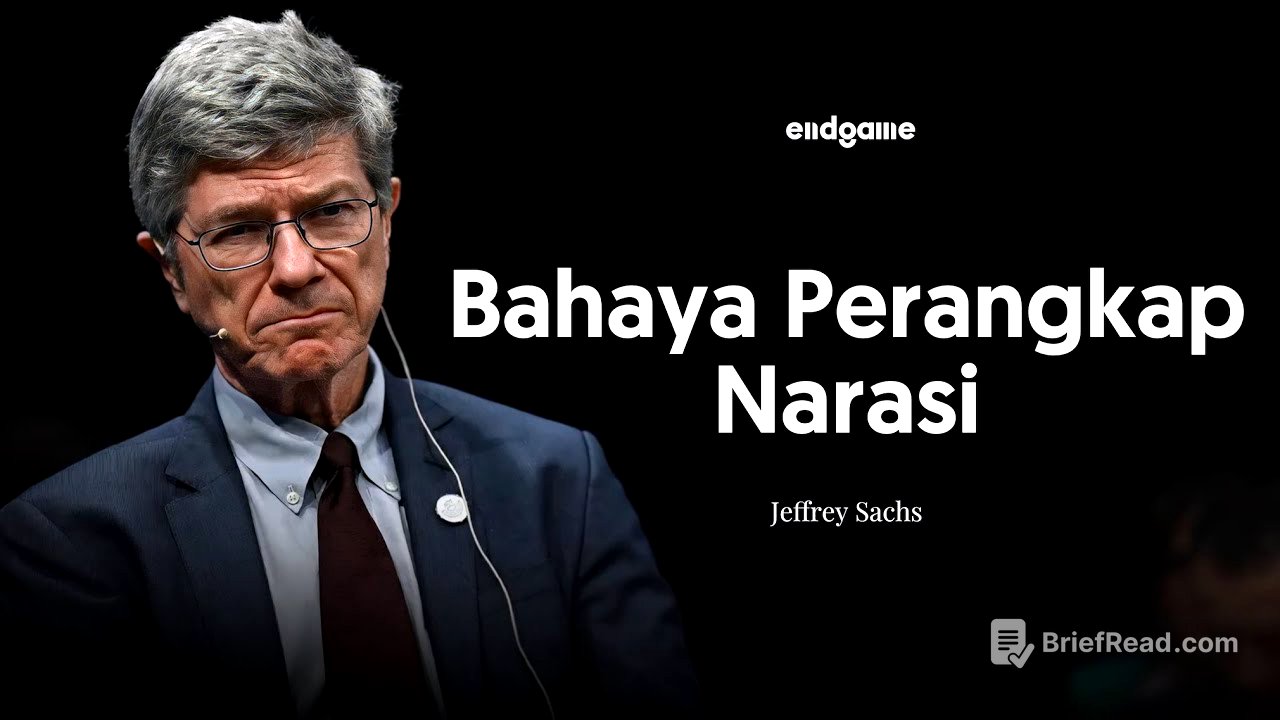TLDR;
This video features an interview with Professor Jeffrey Sachs, who discusses the gap between America's self-perception and reality, the influence of the military-industrial complex and corporate lobbies on US policy, and the need for the US to adopt a less interventionist foreign policy. He also addresses the Israeli-Palestinian conflict, the role of the US in global geopolitics, and the potential for cooperation between Asian countries.
- The US foreign policy is often disconnected from reality due to an overestimation of its power and influence.
- The military-industrial complex and corporate lobbies exert significant control over US policy, marginalizing public opinion.
- The US should end its interventionist foreign policy, cease covert operations, and focus on diplomacy.
- The world needs to stand up to the US and demand an end to the blockade of a Palestinian state.
- China is not a threat, and the US is trying to create one.
Intro [0:00]
The video introduces Professor Jeffrey Sachs from Columbia University, who will be discussing global events and US foreign policy. The host expresses his honor in having Sachs on the show again.
Public opinion-government policy divide [2:07]
Professor Sachs addresses the increasing disconnect between public opinion and government policy, particularly in the US. He attributes this to the power of the military-security apparatus and corporate lobbies. The military-industrial complex operates secretively and is largely immune to public opinion. Corporate lobbies, especially in sectors like finance, oil, and agriculture, exert significant control over policy domains through campaign finance and lobbying efforts. Despite promises to "drain the swamp," presidents often perpetuate this system.
Jeff: America is being delusional [5:17]
Sachs argues that the US has been the dominant global power since 1945 but has become increasingly delusional in its self-perception. While other countries have been catching up in technology and infrastructure, the US political and strategic classes still believe in American exceptionalism. This disconnect has led to a confrontational foreign policy, with the US acting in a "snarly, rather nasty mode with everybody in the world." Sachs points out that Russia and China have demonstrated their capabilities, and India is able to resist US demands, indicating a multipolar world that the US has failed to recognize.
Re-reading the Monroe Doctrine [13:18]
Sachs discusses the Monroe Doctrine, initially a reciprocal agreement where the US pledged not to meddle in European affairs if European powers stayed out of the Western Hemisphere. However, the US abandoned this principle around 125 years ago, becoming an imperialistic power seeking to build its own international empire. This led to interventions and meddling in other countries' affairs, often with negative consequences, such as the overthrow of democracies and the creation of police states.
Ukraine War: A US “game plan” [24:03]
Sachs describes the US involvement in Ukraine as part of a long-term strategy to expand military presence and surround Russia in the Black Sea region. This plan, dating back to the 19th century, has turned Ukraine into a battlefield. He criticizes the American propaganda that portrays Russia as an unprovoked aggressor, obscuring the US role in instigating the conflict.
Propaganda [24:55]
Sachs criticizes the propaganda used by the US government and media to justify its foreign policy actions. He argues that the US often provokes conflicts and then portrays itself as the victim, obscuring its own role in escalating tensions. He uses the example of the Ukraine war to illustrate how the US media presents a one-sided narrative that ignores the history of US intervention in the region.
The only risk the US faces is… [32:58]
Sachs asserts that the only real risk to the US is nuclear war, which is being brought closer by the provocative actions of US foreign policy. He advocates for a return to the original Monroe Doctrine, where the US respects the spheres of influence of other major powers. He argues that the US should not be arming Taiwan or militarizing the first island chain, as these actions create a strategic dilemma for China and increase the risk of conflict.
Netanyahu’s Theater of War [47:11]
Sachs explains the history of the Israeli-Palestinian conflict, tracing its roots back to early Christian Zionism and the Balfour Declaration. He describes how the conflict has been exacerbated by extremist elements within the Israeli government, who are determined to prevent the creation of a Palestinian state. He accuses Prime Minister Netanyahu of creating a "theater of war" in the Middle East by targeting states that support Palestinian militants.
Indonesia’s leadership is needed [49:54]
Sachs calls for international pressure on the US to end its veto of a Palestinian state. He notes that the vast majority of the world supports Palestinian statehood and condemns the ongoing genocide in Gaza. He urges leaders from Indonesia, ASEAN, the Organization of Islamic Cooperation, the Arab League, BRICS, Latin America, and the African Union to stand up to Donald Trump and demand an end to the blockade.
“China is not a threat" [58:13]
Sachs argues that China is not a threat and that the US is trying to create one. He points out that China has a long history of peaceful relations with its neighbors and has never sought to build an overseas empire. He suggests that the US military presence in the region is provoking China and that the US is trying to divide Asian countries to maintain its hegemony.
Trump will make India join RCEP? [1:02:53]
Sachs suggests that Donald Trump's protectionist policies may push India to join RCEP. He argues that India should not trust the US and should instead focus on building stronger relationships with China and other Asian countries. He criticizes the "Quad" security dialogue as a US game to create confrontation with China and emphasizes the shared interest of China and India in creating a multipolar world.









